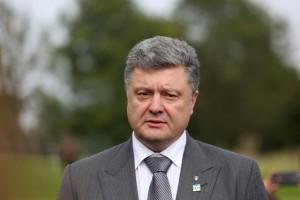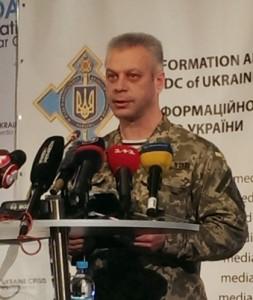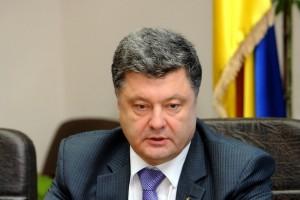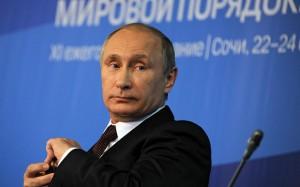Bloomberg: Ukraine Truce in Peril as Russia Is Warned on Sanctions
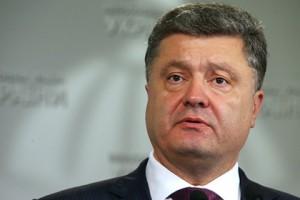
Ukraine’s two-month-old truce was at risk of unraveling as fighting shook rebel-held areas in the east and the U.S. and Germany warned that Russia risked more sanctions over the conflict.
Ukrainian President Petro Poroshenko’s move to revoke the special status of the breakaway areas will scuttle a truce negotiated in Minsk, the rebel regions said yesterday in a joint statement. German Chancellor Angela Merkel urged the European Union to consider more sanctions, while U.S. Secretary of State John Kerry warned “pressure will increase” if the Sept. 5 agreement isn’t implemented.
The standoff is coming to a head after Ukraine and its allies accused separatists of undermining peace efforts with Nov. 2 elections in Donetsk and Luhansk regions. Russian President Vladimir Putin said yesterday that Ukraine’s “civil war” isn’t subsiding as cities continue to come under shelling and the civilian death toll is rising.
“The conflict is incomplete and Russia is set to continue it,” said Oleksiy Melnyk, an analyst at the Razumkov Center for Economic and Political Studies in Kiev. The separatist leaders “are going to continue military action to expand the conflict zone, and the Ukrainian side has to keep that in mind.”
Rebels carried out 15 artillery attacks against government troops overnight, the Defense Ministry in Kiev said today on Facebook. Shelling continued last night in Donetsk, the city council said.
While both sides have said they’re committed to honoring the cease-fire and back peace efforts, Ukraine’s Foreign Ministry said more than 100 servicemen have been killed and 600 wounded in the east since the truce was signed.
Poroshenko said this week that Ukraine has set up new military units to protect the eastern cities of Kharkiv, Dnipropetrovsk and Mariupol.
The risk of an invasion is growing, particularly near the Sea of Azov port of Mariupol, and Russia has sent agents and instructors to separatist areas, Markiyan Lubkivsky, an adviser to Ukrainian Security Service head Valentyn Nalyvaychenko, told RBK-Ukraine news service.
The rebel-held ballots last weekend have deepened a rift between Russia and governments from Washington to Berlin. While Russia says the elections can pave the way to new talks, Kerry countered that they amounted to a “blatant violation” of the law. Merkel said the EU should consider expanding the list of Russian-linked individuals under sanctions to punish those responsible for the votes.
EU foreign policy chief Federica Mogherini also condemned the separatist ballots as “illegal and illegitimate” and said they won’t be recognized. Mogherini said the 28-member bloc was continuing to evaluate sanctions it has imposed on Russian individuals, businesses and industries after Putin’s annexation of Crimea in March. EU foreign ministers are next set to meet on Nov. 17.
Speaking at a news conference in Berlin, Merkel called on all parties to “return to the Minsk plan and achieve a true cease-fire as quickly as possible.”
There’s “no possibility” of easing or lifting current sanctions, she said. The penalties can be “rolled back” if the Minsk agreement is implemented, according to Kerry.
“Based on these illegitimate elections, we should look again at the list of particular individuals who bear responsibility in eastern Ukraine,” Merkel said. “Beyond that, I think we should simply stick with what we have so far in terms of sanctions. We would certainly like to talk about possibly lifting them, but I don’t see such a situation.”
Representatives of 15 German companies held meetings with Russian First Deputy Premier Igor Shuvalov and Foreign Minister Sergei Lavrov yesterday to talk about their operations in Russia amid sanctions, the Moscow-based Kommersant newspaper reported, citing unidentified officials.
The ruble weakened 0.5 percent against the dollar as of 11 a.m. in Moscow, slipping to a new record a day after the central bank shifted its intervention policy to help stem the currency’s plunge.
Russia’s Ambassador to the U.S., Sergei Kislyak, blamed Ukraine for fueling the conflict, saying further sanctions won’t influence Russia. Poroshenko has failed to implement the special-status measure for eastern Ukraine, one of what many instances in which Russia considers Ukrainian authorities haven’t upheld the deal, he said in Washington.
“Sanctions certainty do not help Russia, but we’re not going to change things that are of principal importance to us,” Kislyak told a group of reporters yesterday.
Poroshenko said he’ll ask parliament to annul a law granting more autonomy to the eastern regions that was at the center of the cease-fire negotiated by Ukraine, the rebels, Russia and the Organization for Security and Cooperation in Europe.
Ukraine says the truce has been broken almost every day since it was signed. Prime Minister Arseniy Yatsenyuk said yesterday that government funding to the rebel-held regions will be cut off.
The Minsk agreement has to be revised, the separatists said in yesterday’s statement.
“The law on the special status and the law on amnesty agreed with the Donetsk People’s Republic and the Luhansk People’s Republic were an obligation for Kiev,” they said. Canceling the laws will “in fact cancel the Minsk Protocol.”
Более подробно читайте здесь: IPnews
“Full-scale war” threatens Eastern Ukraine again
(Bloomberg) — Ukraine’s east lurched back toward open war as the government in Kiev and pro-Russian rebels accused eachKiev accused separatists of preparing for renewed
Kiev accused separatists of preparing for renewed conflict in east Ukraine on Tuesday by bringing in «RussianUkraine is going to close state offices, bank services
Ukrainian President Petro Poroshenko issued several decrees on Saturday to shut state institutions and banking servicesPutin discusses ‘deterioration’ in east Ukraine, Kiev
(Reuters) — Russian President Vladimir Putin held talks with top security chiefs on Thursday over a «deterioration ofНет комментариев.
Информация
Посетители, находящиеся в группе Гости, не могут оставлять комментарии к данной публикации.
